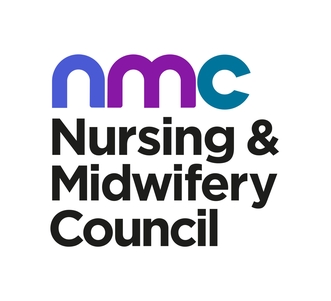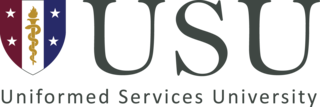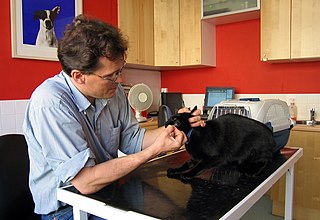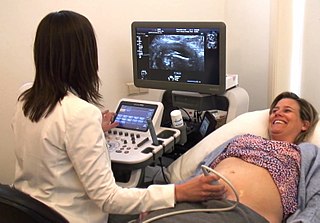
The Nursing and Midwifery Council (NMC) is the regulator for nursing and midwifery professions in the UK. The NMC maintains a register of all nurses, midwives and specialist community public health nurses and nursing associates eligible to practise within the UK. It sets and reviews standards for their education, training, conduct and performance. The NMC also investigates allegations of impaired fitness to practise.

The Royal College of Nursing (RCN) is a registered trade union in the United Kingdom for those in the profession of nursing. It was founded in 1916, receiving its royal charter in 1928. Queen Elizabeth II is the patron. The majority of members are registered nurses; however student nurses and healthcare assistants are also members. There is also a category of membership, at a reduced cost, for retired people.

Uniformed Services University of the Health Sciences (USU) is a health science university of the U.S. federal government. The primary mission of the school is to prepare graduates for service to the U.S. at home and abroad in the medical corps as medical professionals, nurses, and physicians.
A licensed practical nurse (LPN), in much of the United States and Canada, is a nurse who cares for people who are sick, injured, convalescent, or disabled. In the United States, LPNs work under the direction of physicians, mid-level practitioners, and may work under the direction of registered nurses depending on their jurisdiction.

The University of Birmingham Medical School is one of Britain's largest and oldest medical schools with over 400 medical, 70 pharmacy, 140 biomedical science and 130 nursing students graduating each year. It is based at the University of Birmingham in Edgbaston, Birmingham, United Kingdom. Since 2008, the medical school is a constituent of The College of Medical and Dental Sciences.
The General Dental Council (GDC) is an organisation which regulates dental professionals in the United Kingdom. It keeps an up-to-date register of all qualified dentists and other dental care professionals such as: dental hygienists, dental therapists, dental nurses, dental technicians and clinical dental technicians. It was established in 1956 to set and maintain standards in UK dentistry, with the aims of protecting the general public from unqualified dental professionals.

NHS Scotland, sometimes styled NHSScotland, is the publicly funded healthcare system in Scotland, and one of the four systems which make up the National Health Service in the United Kingdom. It operates fourteen territorial NHS boards across Scotland, seven special non-geographic health boards and NHS Health Scotland.
Nursing in the United Kingdom has a long history. The current form of nursing is often considered as beginning with Florence Nightingale who pioneered "modern nursing". Nightingale initiated formal schools of nursing in the United Kingdom in the late 19th and early 20th centuries. The role and perception of nursing has dramatically changed from that of "handmaiden" to the doctor to professionals in their own right. There are over 500,000 nurses in the United Kingdom and they work in a variety of settings, such as hospitals, health centres, nursing homes, hospices, communities, and academia, with most nurses working for the National Health Service (NHS). Nurses work across all demographics and requirements of the public: adults, children, mental health, and learning disability. Nurses work in a range of specialties from the broad areas of medicine, surgery, theatres, and investigative sciences such as imaging. Nurses also work in large areas of sub-specialities such as respiratory, diabetes, neurology, infectious diseases, liver, research, cardiac, and stoma. Nurses often work in multi-disciplinary teams but increasingly are found working independently.
Operating Department Practitioners(ODPs) are specialist allied healthcare professionals or clinicians involved in the planning and delivery of Perioperative Care. They are primarily employed in Surgical Operating Departments but may also work directly within or further their training to facilitate working within a variety of acute clinical settings. These include; pre-hospital emergency care, emergency departments, intensive care units (ICUs), endoscopy suites, interventional radiology, cardiac catheter suites, obstetric theatres and reproductive medicine.
Peninsula College of Medicine and Dentistry (PCMD) now known as Peninsula Dental School and Peninsula Medical School was a Medical and Dental school in England, run in partnership with the University of Exeter, the University of Plymouth and the NHS in Devon and Cornwall. In January 2013 the school began disaggregation to form Plymouth University Peninsula Schools of Medicine and Dentistry and the University of Exeter Medical School. The school had campuses at the University of Plymouth, the University of Exeter, the John Bull Building, the Royal Devon and Exeter Hospital and the Royal Cornwall Hospital. Teaching of medical students also took place at North Devon District Hospital in Barnstaple, South Devon Healthcare Trust in Torbay and General Practices across the region plus a number of community orientated healthcare settings.

Emergency medical personnel in the United Kingdom are people engaged in the provision of emergency medical services. This includes paramedics, emergency medical technicians and emergency care assistants. 'Paramedic' is a protected title, strictly regulated by the Health and Care Professions Council, although there is tendency for the public to use this term when referring to any member of ambulance staff.
The Faculty of Veterinary Science is a faculty of the University of Pretoria. Founded in 1920, it is the second oldest veterinary faculty in Africa. With the exception of the faculties in Khartoum, and Cairo, all the other African faculties were established after 1960. It is the only one of its kind in South Africa and is one of 33 veterinary faculties in Africa.

Nursing is a profession within the health care sector focused on the care of individuals, families, and communities so they may attain, maintain, or recover optimal health and quality of life. They also take on vital roles of education, assessing situations, as support. Nurses may be differentiated from other health care providers by their approach to patient care, training, and scope of practice. Nurses practice in many specialties with differing levels of prescription authority. Nurses comprise the largest component of most healthcare environments; but there is evidence of international shortages of qualified nurses. Many nurses provide care within the ordering scope of physicians, and this traditional role has shaped the public image of nurses as care providers. Nurse practitioners are nurses with a graduate degree in advanced practice nursing. They are however permitted by most jurisdictions to practice independently in a variety of settings. Since the postwar period, nurse education has undergone a process of diversification towards advanced and specialized credentials, and many of the traditional regulations and provider roles are changing.

Andrea Spyropoulos, RGN, SCM, RNT, is a British nurse, clinical strategist and a past president of the Royal College of Nursing (RCN).
Unlicensed assistive personnel (UAP) are paraprofessionals who assist individuals with physical disabilities, mental impairments, and other health care needs with their activities of daily living (ADLs). UAPs also provide bedside care—including basic nursing procedures—all under the supervision of a registered nurse, licensed practical nurse or other health care professional. UAPs must demonstrate their ability and competence before gaining any expanded responsibilities in a clinical setting. While providing this care, UAPs offer compassion and patience and are part of the patient's healthcare support system. Communication between UAPs and registered nurses (RNs) is key as they are working together in their patients' best interests. The scope of care UAPs are responsible for is delegated by RNs or other clinical licensed professionals.

Veterinary medicine in the United Kingdom is the performance of veterinary medicine by licensed professionals. It is strictly regulated by the statute law, notably the Veterinary Surgeons Act 1966. Veterinary medicine is led by veterinary physicians, termed "veterinary surgeons", normally referred to as "vets".
The history of nursing in the United Kingdom relates to the development of the profession since the 1850s. The history of nursing itself dates back to ancient history, when the sick were cared for in temples and places of worship. In the early Christian era, nursing in the United Kingdom was undertaken by certain women in the Christian Church, their services being extended to patients in their homes. These women had no real training by today's standards, but experience taught them valuable skills, especially in the use of herbs and folk drugs, and some gained fame as the physicians of their era. Remnants of the religious nature of nurses remains in Britain today, especially with the retention of the job title "Sister" for a senior female nurse.

A midwife is a health professional who cares for mothers and newborns around childbirth, a specialization known as midwifery.

The British Association of Dental Nurses (BADN) is an organisation that represents dental nurses across the UK, headquartered in Lancashire, and has previously been a trade union.

David Charles Benton is a British nurse and regulatory and health policy expert who is the 5th Chief Executive Officer of the National Council of State Boards of Nursing (NCSBN) based in Chicago, Illinois, USA. Benton was previously Chief Executive Officer of the International Council of Nurses in Geneva, Switzerland. Benton publishes on nursing and health policy, leadership, occupational licensure and nurse regulatory models, workforce and migration, and research methods including the use of social network analysis, and bibliometric analysis.














